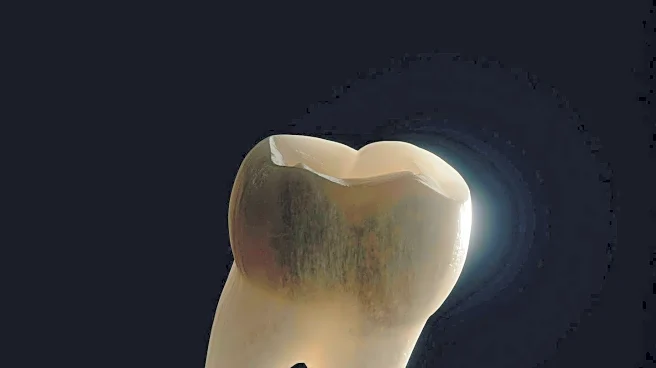What's Happening?
Theradaptive, Inc., a biotechnology company specializing in targeted protein therapeutics for tissue regeneration, has commenced the RESTORE International Phase I/II Feasibility Study. This study aims to assess the safety and efficacy of OsteoAdapt DE, a regenerative product designed to enhance bone growth in alveolar ridge augmentation, a dental reconstruction procedure. The first patient was treated at Rabin Medical Center in Israel, marking a significant step in advancing dental and craniomaxillofacial repair. OsteoAdapt DE utilizes AMP2 technology, which incorporates an osteoinductive component to actively promote bone formation, potentially reducing healing time and improving surgical outcomes.
Why It's Important?
The development of OsteoAdapt DE is crucial for improving dental reconstruction outcomes, particularly in cases involving jaw restoration after fractures or oncology resections. The technology promises to deliver predictable and robust bone regeneration, addressing the limitations of traditional graft materials that often leave residual material and increase complication risks. Supported by the Armed Forces Institute of Regenerative Medicine, the study also holds military relevance, offering potential benefits for treating combat-related facial and jaw injuries. This advancement could significantly impact patient care in both civilian and military contexts, enhancing recovery and implant readiness.
What's Next?
The RESTORE trial will continue to evaluate OsteoAdapt DE against standard xenograft bone grafts, focusing on its safety and performance. As the study progresses, Theradaptive aims to expand its bone regeneration program, attracting interest from strategic partners in spine, orthopedics, and sports medicine. The successful completion of this trial could lead to broader applications of the OsteoAdapt platform, potentially revolutionizing regenerative medicine across multiple therapeutic areas. Further developments are anticipated as Theradaptive continues its clinical pipeline with ongoing trials like OASIS for lumbar spinal fusion.
Beyond the Headlines
The implications of OsteoAdapt DE extend beyond immediate clinical applications, potentially influencing the future of regenerative medicine. The technology's ability to target stem cell recruitment and control bone regeneration may pave the way for advancements in personalized medicine, offering tailored solutions for diverse patient needs. Additionally, the study's support from military research funding highlights the intersection of healthcare innovation and defense priorities, underscoring the importance of regenerative technologies in addressing complex medical challenges.









